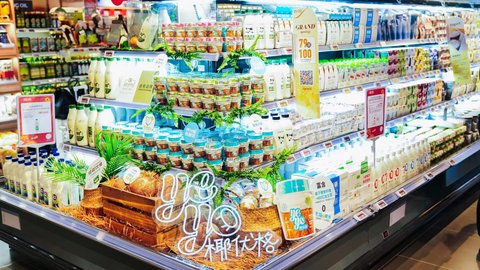Marvelous Foods launches Yeyo plant-based coconut yogurt in China’s biggest premium supermarket chain Ole
March 12, 2024 - 2 min read
BEIJING China, March 12, 2024 – Alternative protein company Marvelous Foods kicked off the year of the dragon with the launch of its Yeyo plant-based coconut yogurt products in Ole supermarkets. A boutique supermarket brand under China Resources Vanguard, Ole is the biggest premium Chinese supermarket chain with 100 stores across 31 key cities and over 10 million registered members.
Yeyo yogurt will first begin hitting the shelves of Ole stores in Beijing. Beijing was selected as Ole plans to open a new low carbon lifestyle concept store which will offer better consumer education opportunities that support improved showcasing of plant-based products. Marvelous Foods will work closely with Ole’s Beijing team to bring best practices from the regional launch to other cities.
“Chinese consumers are hungry for new food innovations so it’s easy to get over-hyped about pushing the boat out into China’s mass market,” says Founder and CEO Christiana Zhu. “The recent wave of plant-based brand wind-downs in China has taught us that it is critical to maintain consumer relevance for food innovations beyond trial phase. To achieve this, it is important to build solid understanding for your product’s unique value proposition at a pace that matches target market expansion.”
With a niche and premium launch strategy, Yeyo first focused on fitness loving tier 1 city gen Y females aged 25-35 as the brand’s early adopters, partnering with fitness lifestyle brands such as Lululemon and Nike in community marketing activations. Yeyo products have a high repeat purchase rate on its Tmall store and is currently the best-selling plant-based yogurt on the platform. The brand’s offline presence includes premium retail partners such as City Super, BHG and ALDI. Pacing its growth with China’s post-COVID market reopening, it plans to further expand its offline offerings through F&B this year.
“2022 and 2023 were tough for F&B in China, but recent data shows that the hospitality industry is seeing good growth again,” says Zhu. “We have been invited to showcase our products with chefs from top hotel groups such as Marriott and IHG, who are being encouraged to incorporate more sustainable ingredients in their menus. We’ve seen how food service and hospitality has played a vital role in educating consumers about sustainable plant-based eating in other markets, and we believe this will also be important here. Modern plant-based foods is still a nascent category in China, but we are committed to fostering its growth step by step.”


















